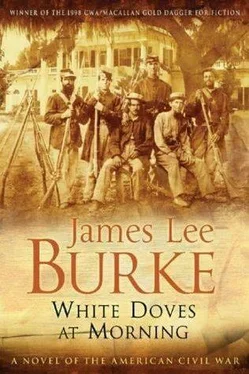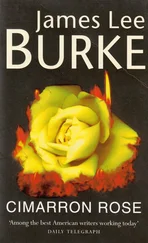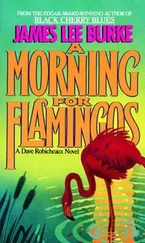Then he heard a woman, a prostitute, running from one officer to the next, begging mercy for the wounded. The musket fire dissipated, and Willie got to his feet and ran for the treeline, not a survivor, but instead cursed with an abiding sense of shame and guilt that he had lived, fleeing through woods while the screams of his comrades filled his ears.
When Willie woke from the dream in a backroom of his mother's boardinghouse on Bayou Teche, he knew the fear that beat in his heart had nothing to do with his dead father's tale of his own survival at the Goliad Massacre during the Texas Revolution. The war he feared was now only the stuff of rumors, political posturing, and young men talking loudly of it in a saloon, but he had no doubt it was coming, like a crack in a dike that would eventually flood and destroy an entire region, beginning in Virginia or Maryland, perhaps, at a nameless crossroads or creek bed or sunken lane or stone wall meandering through a farmer's field, and as surely as he had wakened to birdsong in his mother's house that morning he would be in it, shells bursting above his head while he soiled his pants and killed others or was killed himself over an issue that had nothing to do with his life.
He washed his face in a bowl on the dresser and threw the water out the window onto the grassy yard that sloped down to the bayou. By the drawbridge a gleaming white paddle-wheeler, its twin stacks leaking smoke into the mist, was being loaded with barrels of molasses by a dozen Negro men, all of whom had begun work before dawn, their bodies glowing with sweat and humidity in the light from the fires they had built on the bank.
They were called wage slaves, rented out by their owner, in this case, Ira Jamison, on an hourly basis. The taskmaster, a man named Rufus Atkins, rented a room at the boardinghouse and worked the Negroes in his charge unmercifully. Willie walked out into the misty softness of the morning, into the residual smell of night-blooming flowers and bream spawning in the bayou and trees dripping with dew, and tried to occupy his mind with better things than the likes of Rufus Atkins. But when he sat on a hole in the privy and heard Rufus Atkins driving and berating his charges, he wondered if there might be an exemption in heaven for the Negro who raked a cane knife across Atkins' throat.
When Willie walked back up the slope and encountered Atkins on his way into breakfast, he touched his straw hat, fabricated a smile and said, "Top of the morning to you, sir."
"And to you, Mr. Willie," Rufus Atkins replied.
Then Willie's nemesis, his inability to keep his own counsel, caught up with him.
"If words could flay, I'd bet you could take the hide off a fellow, Mr. Atkins," he said.
"That's right clever of you, Mr. Willie. I'm sure you must entertain your mother at great length while tidying the house and carrying out slop jars for her."
"Tell me, sir, since you're in a mood for profaning a fine morning, would you be liking your nose broken as well?" Willie inquired.
AFTER the boarders had been fed, including Rufus Atkins, Willie helped his mother clean the table and scrape the dishes into a barrel of scraps that later they would take out to their farm by Spanish Lake and feed to their hogs. His mother, Ellen Lee, had thick, round, pink arms and brown hair that was turning gray, and a small Irish mouth and a cleft in her chin.
"Did I hear you have words with Mr. Atkins?" she asked.
Willie seemed to study the question. "I don't rightly recall. It may have been a distortion on the wind, perhaps," he replied.
"You're a poor excuse for a liar," she said.
He began washing dishes in the sink. But unfortunately she was not finished.
"The times might be good for others but not always for us. Our livery is doing poorly, Willie. We need every boarder we can get," she said.
"Would you like me to apologize?" he asked.
"That's up to your conscience. Remember he's a Protestant and given to their ways. We have to forgive those whom chance and accident have denied access to the Faith."
"You're right, Mother. There he goes now. I'll see if I can straighten things out," Willie replied, looking through the back window.
He hurried out the door and touched Rufus Atkins on the sleeve.
"Oh, excuse me, I didn't mean to startle you, Mr. Atkins," he said. "I just wanted to tell you I'm sorry for the sharpness of my tongue. I pray one day you find the Holy Roman Church and then die screaming for a priest."
WHEN he came back into the house his mother said nothing to him, even though she had heard his remarks to Rufus Atkins through the window. But just before noon she found him in his reading place under a live oak by the bayou and pulled up a cane chair next to him and sat down with her palms propped on her knees.
"What ails you, Willie?" she asked.
"I was just a little out of sorts," he replied.
"You've decided, haven't you?" she said.
"What might that be?"
"Oh, Willie, you're signing up for the army. This isn't our war," she said.
"What should I do, stay home while others die?"
She looked emptily at the bayou and a covey of ducklings fluttering on the water around their mother.
"You'll get in trouble," she said.
"Over what?"
"You're cursed with the gift of Cassandra. For that reason you'll always be out of place and condemned by others."
"Those are the myths that our Celtic ancestors used to console themselves for their poverty," he replied.
She shook her head, knowing her exhortations were of little value. "I need you to fix the roof. What are your plans for today?" she asked.
"To take my clothes to Ira Jamison's laundry."
"And get in trouble with that black girl? Willie, tell me I haven't raised a lunatic for a son," she said.
HE put a notebook with lined pages, a pencil, and a small collection of William Blake's poems in his pants pockets and rode his horse down Main Street. The town had been laid out along the serpentine contours of Bayou Teche, which took its name from an Atakapa Indian word that meant snake. The business district stretched from a brick warehouse on the bend, with huge iron doors and iron shutters over the windows, down to the Shadows, a two-story, pillared plantation home surrounded by live oaks whose shade was so deep the night-blooming flowers in the gardens often opened in the late afternoon.
An Episcopalian church marked one religious end of the town, a Catholic church the other. On the street between the two churches shopkeepers swept the plank walks under their colonnades, a constable spaded up horse dung and tossed it into the back of a wagon, and a dozen or so soldiers from Camp Pratt, out by Spanish Lake, sat in the shade between two brick buildings, still drunk from the night before, flinging a pocketknife into the side of a packing case.
Actually the word "soldier" didn't quite describe them, Willie thought. They had been mustered in as state militia, most of them outfitted in mismatched uniforms paid for by three or four Secessionist fanatics who owned cotton interests in the Red River parishes.
The most ardent of these was Ira Jamison. His original farm, named Angola Plantation because of the geographical origins of its slaves, had expanded itself in ancillary fashion from the hilly brush country on a bend of the Mississippi River north of Baton Rouge to almost every agrarian enterprise in Louisiana, reaching as far away as a slave market in Memphis run by a man named Nathan Bedford Forrest.
Willie rode his horse between the two buildings where the boys in militia uniforms lounged. Some were barefoot, some with their shirts off and pimples on their shoulders and skin as white as a frog's belly. One, who was perhaps six and a half feet tall, his fly partially buttoned, slept with a straw hat over his face.
Читать дальше












